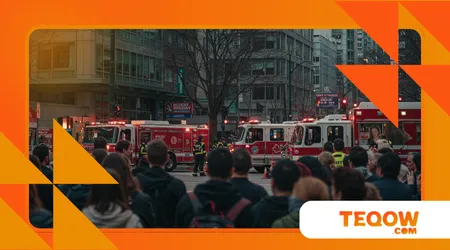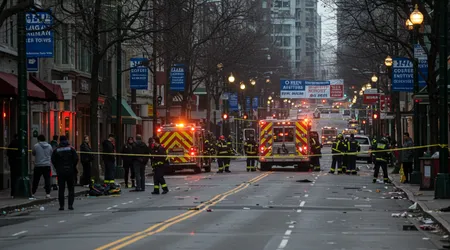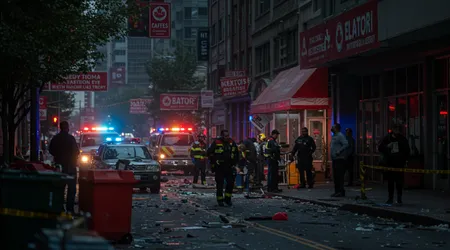Tragedy Strikes Vancouver on Election Eve with Mass Casualty Incident

Tragedy strikes Vancouver on election eve, shattering the festive spirit of the Lapu Lapu Day festival and casting a shadow over Canada’s federal election.
On April 26, 2025, a black SUV plowed through a crowd celebrating Filipino heritage, killing 11 and injuring dozens.
This horrific incident, occurring just hours before polls opened, stunned a nation already grappling with heated campaign rhetoric and U.S. trade tensions.
As Vancouver reels, questions swirl about public safety, mental health, and the resilience of a community bound by grief.
This article unpacks the tragedy’s impact, its ripple effects on the election, and the path forward for a wounded city.
The Lapu Lapu festival, a vibrant celebration of Filipino culture, drew thousands to East 43rd Avenue and Fraser Street.
Families danced, vendors sold adobo, and children laughed until chaos erupted. Witnesses described a deafening crash, screams, and bodies strewn across the pavement.
The suspect, 30-year-old Kai-Ji Adam Lo, was arrested at the scene, charged with eight counts of second-degree murder.
Police confirmed Lo’s history of mental health issues, ruling out terrorism but leaving a city searching for answers. As Canada voted, Vancouver mourned, its Filipino community at the heart of the pain.
This tragedy isn’t just a local wound; it’s a national reckoning. How does a country balance joy and safety?
The election, pitting Prime Minister Mark Carney’s Liberals against Pierre Poilievre’s Conservatives, took a somber turn as leaders paused campaigns to honor victims.
Yet, the incident raises deeper questions about urban safety protocols, mental health support, and the fragility of public spaces.
This piece dives into the human toll, systemic gaps, and a community’s resolve to heal, offering a lens on a nation at a crossroads.
The Night That Changed Vancouver
A warm April evening turned to horror when tragedy strikes Vancouver on election eve. At 8 p.m., a black SUV barreled through the Lapu Lapu festival.
James Cruzat, a local business owner, heard the engine rev, then a “loud bang” he mistook for gunfire. “People were screaming, running, crying,” he told CBC News.
Eleven lives were lost, including young people, and over 20 were injured, some critically. The scene, littered with debris and despair, became a grim tableau of loss.
Emergency responders acted swiftly, declaring a Code Orange mass casualty event.
Vancouver General Hospital received the worst cases, with reports of over 70 casualties. Bystanders detained Lo before police arrived, a small act of courage amid chaos.
Acting Chief Steve Rai called it “the darkest day in Vancouver’s history,” a sentiment echoed by Mayor Ken Sim, who vowed a safety review.
The Filipino community, vibrant and tight-knit, bore the brunt of this senseless act.
The festival, in its second year, celebrated Lapu-Lapu, a Filipino hero who resisted Spanish colonization. Organizers had planned a parade, basketball tournament, and cultural stalls.
Instead, tragedy strikes Vancouver on election eve, turning joy into mourning. Vigils sprang up, with hundreds gathering at St.
Mary the Virgin Church. A handwritten note at a memorial read, “Your light lives on,” beside Philippine flags and flowers. The community’s grief is palpable, yet their resilience shines through.
++ Liberal Leader Mark Carney Faces Questions Over Trump’s “51st State” Comments
Grief counselors flooded the area, offering support to witnesses like Adonis Quita, whose son, newly arrived from the Philippines, saw the carnage.
“He’s shaken, but we’ll heal together,” Quita said. The Philippine Consulate pledged aid, coordinating with Canadian authorities.
Tragedy strikes Vancouver on election eve, but the Filipino concept of bayanihan communal unity emerged as a beacon.
This spirit, rooted in helping neighbors, now guides a city’s recovery.

A Nation Pauses on Election Eve
As tragedy strikes Vancouver on election eve, Canada’s federal election took an unexpected turn. Mark Carney, addressing the nation, called the victims’ families “living every family’s nightmare.”
He canceled rallies in Calgary and Richmond, opting for a vigil instead.
Pierre Poilievre, speaking in Oakville, expressed solidarity with the Filipino community, while Jagmeet Singh, who attended the festival earlier, was visibly shaken.
“Kids were there, full of joy,” he said, canceling B.C. events.
Also read: Hudson’s Bay Begins Liquidation: The End of a Canadian Retail Icon
The election, already tense with U.S. tariff threats looming, shifted focus. Voters, expected to choose between Carney’s economic steadiness and Poilievre’s populist surge, now faced a somber backdrop.
Tragedy strikes Vancouver on election eve, prompting leaders to tread carefully. Bloc Québécois’s Yves-François Blanchet maintained his schedule but offered condolences.
The nation, united in grief, grappled with a vote that felt secondary to Vancouver’s pain.
A 2025 CBC News poll showed 68% of Canadians felt public safety was a top election issue, a statistic amplified by this tragedy.
Tragedy strikes Vancouver on election eve, raising questions about event security. Vancouver police had deemed the festival low-risk, omitting heavy barricades.
Interim Chief Rai admitted this was a “watershed moment,” promising reforms. The election’s outcome may hinge on how leaders address such systemic gaps.
Imagine a tightrope walker, balancing joy and caution, only to fall when the wind shifts. That’s Vancouver now, teetering between celebration and vigilance.
Political leaders, aware of this, face pressure to act. Tragedy strikes Vancouver on election eve, and while votes are cast, the nation watches Vancouver.
Read more: Ontario’s Electric Vehicle Supply Chain Gets a Boost
Will promises of safety hold, or will grief reshape the political landscape? The answer lies in the days ahead.
Systemic Gaps and Public Safety
The question lingers: could this have been prevented? When tragedy strikes Vancouver on election eve, it exposes cracks in urban safety.
Vancouver police conducted a risk assessment, finding no threats to the festival. No barricades or dedicated officers were deployed, a decision now under scrutiny.
Mayor Sim ordered a full review, acknowledging that most events are safe but this one wasn’t. The city, home to 140,000 Filipino Canadians, must rethink its approach.
Mental health support, or its absence, also looms large. Kai-Ji Adam Lo, known to police, had a documented history of mental health struggles.
Tragedy strikes Vancouver on election eve, and experts point to Canada’s strained mental health system.
A 2024 Canadian Mental Health Association report noted that 1 in 5 Canadians face mental health challenges yearly, yet funding lags.
Lo’s case, while not terror-related, underscores the need for intervention before crises escalate.
| Aspect | Details |
|---|---|
| Event | Lapu Lapu Day festival, April 26, 2025 |
| Casualties | 11 dead, 20+ injured |
| Suspect | Kai-Ji Adam Lo, 30, charged with 8 counts of second-degree murder |
| Police Response | Code Orange declared, suspect arrested at scene |
| Safety Measures | No barricades or dedicated officers due to low-risk assessment |
| Community Response | Vigils, bayanihan spirit, Philippine Consulate aid |
Consider Sarah, a fictional Vancouver mom who took her kids to the festival, expecting a joyful evening. She now questions every public event’s safety.
Tragedy strikes Vancouver on election eve, amplifying such fears. Cities like Toronto and Montreal use bollards and police patrols at major festivals Vancouver may follow suit.
But can safety coexist with open, vibrant public spaces? The debate is urgent.
Funding is another hurdle. Mental health programs, often understaffed, struggle to reach those like Lo.
Community-based interventions, like mobile crisis units, could bridge gaps but require investment. Tragedy strikes Vancouver on election eve, and taxpayers may demand action.
Political promises during the campaign Carney’s infrastructure pledges, Poilievre’s crime reduction plans must now address these realities.
Vancouver’s future depends on it.
The Filipino Community’s Resilience

Vancouver’s Filipino community, though grieving, stands strong. When tragedy strikes Vancouver on election eve, their bayanihan spirit shines.
At Kensington Park, Mikkaela Valencia hugged Kayla Vargas during a vigil, embodying communal support. Organizers, devastated, urged against sharing violent videos, focusing on healing.
“This doesn’t define us,” said RJ Aquino of Filipino BC, invoking Lapu-Lapu’s defiance.
Philippine President Ferdinand Marcos Jr. called the loss “unspeakable,” pledging support. Tragedy strikes Vancouver on election eve, yet the community rallies.
Churches overflowed with mourners, and strangers left flowers at memorials. King Charles, in a rare statement, expressed solidarity, noting the “utterly tragic loss.”
The Filipino diaspora, 850,000 strong in Canada, mourns collectively, their grief transcending borders.
Take Maria, a fictional nurse who lost a cousin in the attack. She volunteers at vigils, cooking lumpia for mourners, channeling pain into purpose.
Tragedy strikes Vancouver on election eve, but stories like hers inspire. Community centers offer counseling, and local businesses donate to victims’ families.
This resilience, rooted in history, mirrors Lapu-Lapu’s resistance a refusal to be broken.
The election, though critical, feels distant to many Filipinos now. Political leaders’ condolences resonate, but action matters more.
Tragedy strikes Vancouver on election eve, and the community demands safer spaces. Their unity, a blend of sorrow and strength, challenges Vancouver to rebuild trust.
As votes are counted, their voices will shape the city’s future.
A Path Forward: Healing and Reform
Healing begins with acknowledgment. Tragedy strikes Vancouver on election eve, and Vancouver must act.
Mayor Sim’s safety review is a start, but broader reforms are needed. Bollards, police presence, and risk assessments must become standard for public events.
Toronto’s 2018 van attack prompted similar changes Vancouver can learn from them. The cost is high, but so is the price of inaction.
Mental health reform is equally critical. Tragedy strikes Vancouver on election eve, highlighting systemic gaps.
Canada’s 2025 budget allocated $2.5 billion for mental health, but implementation lags. Mobile crisis teams, early intervention programs, and community clinics could prevent future tragedies.
Lo’s case, while unique, reflects a broader need for accessible care. Will leaders deliver?
The Filipino community’s bayanihan offers a model for recovery. Tragedy strikes Vancouver on election eve, yet their unity inspires.
Schools, churches, and businesses can foster dialogue, ensuring no one feels alone. Carney’s vigils and Poilievre’s condolences must translate into policy.
A nation watches, hoping Vancouver emerges stronger, its spirit unbroken.
Picture a phoenix, rising from ashes, wings scorched but soaring. That’s Vancouver’s potential now.
Tragedy strikes Vancouver on election eve, but it’s not the end. By investing in safety, mental health, and community, the city can honor the fallen.
The election’s outcome, whatever it may be, must prioritize these steps. Vancouver’s heart beats on, resilient and resolute.
Conclusion: A City and Nation at a Crossroads
When tragedy strikes Vancouver on election eve, it does more than claim lives it tests a city’s soul and a nation’s resolve.
The Lapu Lapu festival, meant to celebrate heritage, became a symbol of loss, yet Vancouver’s response vigils, unity, and calls for change shows its strength.
The Filipino community, guided by bayanihan, leads the way, their grief a catalyst for healing. Canada, voting amid sorrow, faces a choice: ignore the cracks or rebuild stronger.
This tragedy, occurring as ballots were cast, underscores the fragility of public spaces and the urgency of reform.
Safety protocols, mental health support, and community resilience aren’t just policies they’re lifelines. Tragedy strikes Vancouver on election eve, but it also sparks hope.
Will we rise, like a phoenix, to honor the fallen? Vancouver’s answer will shape Canada’s future, one step at a time.
Frequently Asked Questions
What happened at the Lapu Lapu festival in Vancouver?
On April 26, 2025, a black SUV driven by Kai-Ji Adam Lo plowed into the crowd, killing 11 and injuring over 20. Lo faces murder charges.
Was the Vancouver attack related to the election?
No, police ruled out terrorism or political motives. The suspect had mental health issues, and the timing near the election was coincidental.
How is the Filipino community responding?
The community has rallied with vigils, counseling, and bayanihan spirit, supported by local and Philippine authorities, focusing on healing and resilience.
What safety changes are proposed?
Mayor Sim ordered a safety review, with potential measures including bollards, police patrols, and stricter risk assessments for public events.
